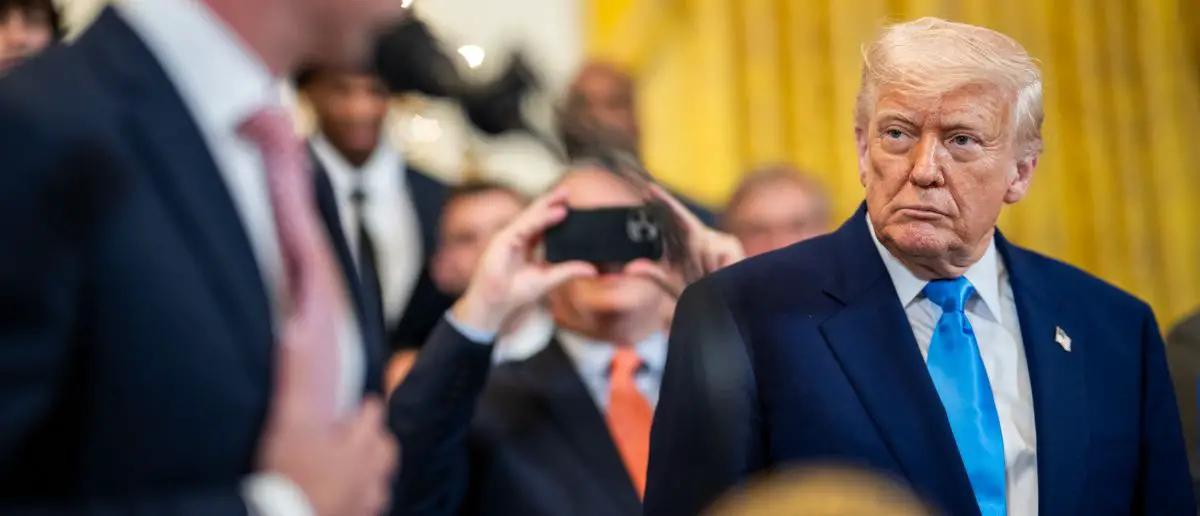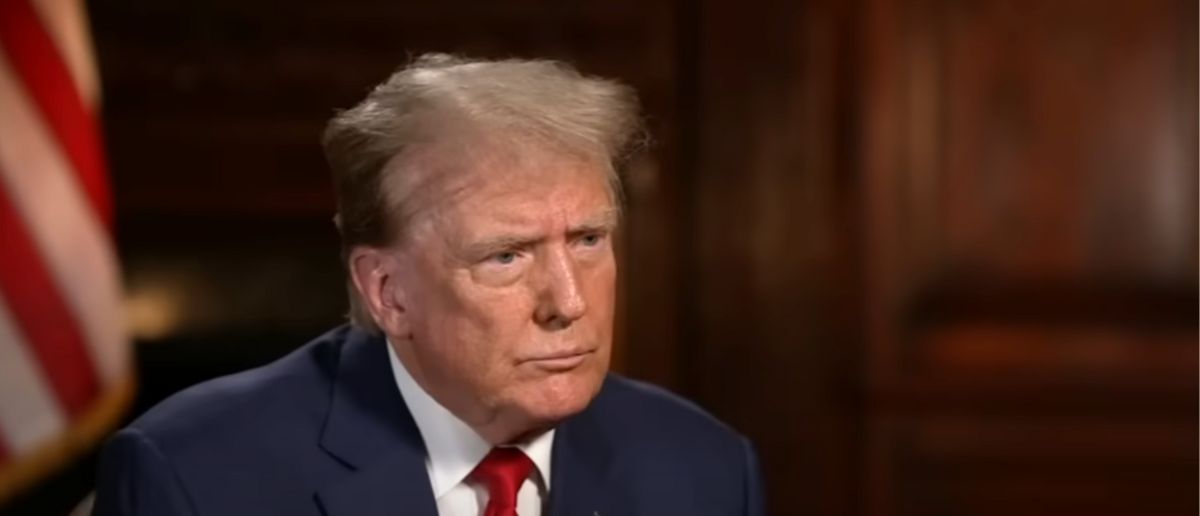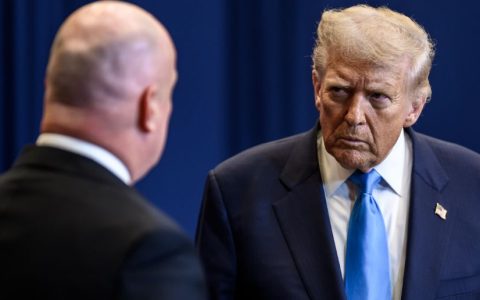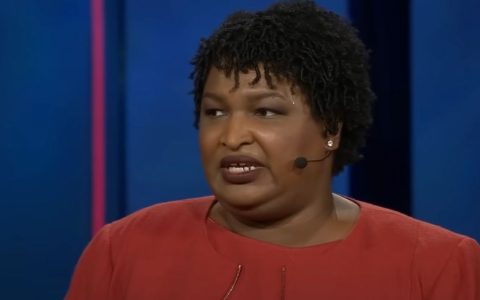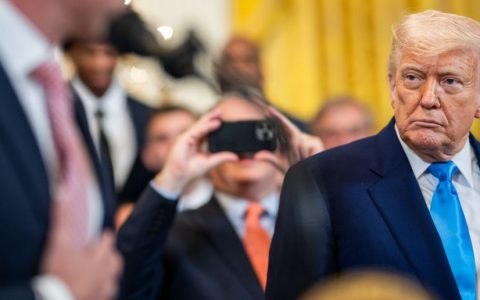
Donald Trump is full of surprises. You can never be sure what he’s going to do.
And Trump uttered two words in front of rolling cameras that Washington, D.C. stunned in disbelief.
Trump Addresses Gaza Crisis and Pushes for Humanitarian Action
During a meeting with U.K. Prime Minister Keir Starmer at his Turnberry golf resort, President Donald Trump announced plans to collaborate with European allies to establish food distribution centers in Gaza, directly challenging Israeli Prime Minister Benjamin Netanyahu’s claim that the region faces “no starvation.” Trump’s remarks signal a shift from his earlier stance during a Scotland trip, where he was less critical of Israel’s approach.
“Based on television… those children look very hungry,” Trump stated, emphasizing the dire situation. “But we’re giving a lot of money and a lot of food, and other nations are now stepping up.” He later emphasized the severity, saying, “Some of those kids are — that’s real starvation stuff.”
Trump’s comments come amid growing international criticism of Israel’s handling of Gaza’s humanitarian crisis, with allies like the U.K., France, and Germany pressing for action. While Trump dismissed recognizing Palestine as a state, he expressed no objection to European allies pursuing that path, marking a nuanced divergence from Netanyahu’s position.
Over 200 British parliamentarians signed a letter urging immediate recognition of a Palestinian state. Starmer echoed the urgency, stating last week, “the suffering and starvation unfolding in Gaza is unspeakable and indefensible,” and described statehood as “the inalienable right of the Palestinian people.” French President Emmanuel Macron also confirmed France’s decision to recognize Palestine, while a joint statement from the U.K., France, and Germany called for ending the conflict and lifting aid restrictions.
Trump raised concerns about Hamas stealing food aid, though several reports have questioned or debunked these claims. He appeared deeply affected by images of suffering, saying, “I see it, and you can’t fake that,” and vowed increased U.S. involvement, adding, “So, we’re going to be even more involved.”
On Saturday, as global outrage grew over images of malnourished and deceased children, the Israel Defense Forces announced aid airdrops and the opening of humanitarian corridors for U.N. convoys. However, Israel maintains that starvation claims are exaggerated and driven by Hamas propaganda.
Starmer, addressing Trump, described Gaza’s situation as an “absolute catastrophe” and noted, “And I think people in Britain are revolted at what they’re seeing on their screens.” He emphasized the need for a ceasefire, thanking Trump for his efforts and stressing the urgency of delivering more aid.
After discussions with Netanyahu over the weekend, Trump indicated a need for a new approach, saying, “I told Israel, I told Bibi, that you have to now maybe do it a different way.” He also criticized Hamas for not releasing remaining hostages, highlighting ongoing tensions in ceasefire negotiations.
"Children look very hungry, we're giving a lot of money and a lot of food," US President Donald Trump says when asked about the situation in Gaza
"People in Britain are revolted at what they're seeing," PM Keir Starmer adds
Follow live: https://t.co/hcIGbzvO0F pic.twitter.com/spHA72rzD7
— BBC Politics (@BBCPolitics) July 28, 2025
Trump’s Anti-War Stance and Bold Middle East Policy
President Donald Trump has positioned himself as a proponent of peace in the Middle East, advocating for diplomatic solutions to end conflicts while demonstrating a willingness to take decisive action when necessary. His approach combines a commitment to de-escalation with strategic interventions, such as the strike on Iran and policy divergences with Israeli Prime Minister Benjamin Netanyahu, to secure stability in the region.
Trump’s push for peace was evident in his July 2025 announcement of a 60-day ceasefire proposal for Gaza, urging Hamas to accept terms that would involve releasing hostages and increasing humanitarian aid. “Israel has agreed to the necessary conditions to finalize the 60 Day CEASEFIRE, during which time we will work with all parties to end the War,” Trump stated, emphasizing his role in brokering negotiations through Egypt and Qatar. Despite Hamas’s hesitance and Israel’s insistence on dismantling Hamas, Trump’s efforts reflect a desire to halt the violence that has claimed nearly 60,000 lives since October 2023.
Trump’s divergence from Netanyahu became clear when he criticized Israel’s approach to Gaza’s humanitarian crisis. “I told Bibi, that you have to now maybe do it a different way,” he said, signaling a willingness to challenge Israel’s strategy to push for more effective aid delivery and ceasefire progress. This public disagreement highlights Trump’s readiness to break from traditional U.S.-Israel alignment when it serves his peace objectives.
However, Trump’s peace efforts are not without bold, controversial actions. His administration’s strike on Iranian nuclear facilities in June 2025, alongside Israel, aimed to weaken Iran’s support for groups like Hamas and Hezbollah, creating a window for diplomatic progress. While criticized by some as escalatory, Trump framed it as a necessary step to curb Iran’s nuclear ambitions and stabilize the region, warning of “obliteration” if Iran retaliated. This demonstrates his strategy of using targeted military action to strengthen his hand in peace negotiations.
Trump’s Gaza takeover proposal in February 2025, suggesting U.S. administration of the enclave and relocation of Palestinians, sparked global controversy and accusations of violating international law. While he described it as a humanitarian effort to rebuild Gaza into “the Riviera of the Middle East,” the plan drew sharp rebukes from Arab nations and Hamas, who called it a “recipe for creating chaos.” The White House later clarified that no U.S. troops or funds would be committed, suggesting Trump’s proposal was partly a diplomatic maneuver to pressure stakeholders toward a resolution.
Despite the backlash, Trump’s Gaza plan reflects his willingness to propose radical solutions to break deadlocks, even if they risk short-term tensions. His simultaneous push for Israel-Saudi normalization, a potential “game-changer” for regional stability, shows his focus on long-term peace. Saudi Arabia’s insistence on a Palestinian state as a condition for normalization aligns with Trump’s goal of reshaping Middle East dynamics to counter Iran’s influence.

